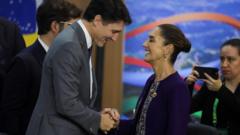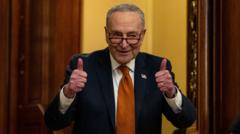Following President-elect Trump's warning of a potential 25% tariff on Canada and Mexico unless border issues are resolved, relations between the two countries have soured. Canadian officials emphasize their border's distinct challenges, while Mexico asserts its need for respect as an equal trade partner.
Tensions Rise in North America as Trump’s Tariff Threat Disrupts Canada-Mexico Relations

Tensions Rise in North America as Trump’s Tariff Threat Disrupts Canada-Mexico Relations
The recent tariff threat from President-elect Donald Trump has intensified strains between Canada and Mexico, with both nations grappling with border security perceptions and economic ties.
In a developing situation influenced by looming tariffs from President-elect Donald Trump, tensions between Canada and Mexico have surfaced, prompting each nation to re-evaluate its relationship amidst concerns over border security. Trump has threatened to impose a blanket 25% tariff on both countries if they are unable to secure their borders with the United States.
Canadian authorities quickly distanced their border issues from those faced by Mexico, citing significantly lower levels of drug smuggling and illegal crossings. Canadian officials, including Prime Minister Justin Trudeau, highlighted the unique nature of their border in contrast to Mexico's, with Trudeau allegedly remarking that the Canadian border is “vastly different" during a recent dinner at Mar-a-Lago. Such remarks have provoked strong responses from Mexican President Claudia Sheinbaum, who emphasized that Mexico deserves respect from its trade partners. She pointed out that Canada also grapples with its own social challenges, including fentanyl use.
Doug Ford, premier of Ontario, voiced his displeasure with Trump’s categorization of Canada alongside Mexico on border security, deeming it the “most insulting thing” spoken by the U.S. to Canada. The comments have prompted concerns about bilateral ties, as officials argue for a united North America against external threats, specifically highlighting China's influence in Mexico.
The backdrop to these tensions is the North American trade agreement, which is on track for renegotiation in 2026. Both Canada and the U.S. have already imposed significant tariffs on Chinese imports. Ford has pushed for exclusive trade deals between the nations, urging action to resolve long-standing trade concerns.
Experts have observed that the strain in relations has caused both countries to reassess their partnerships more critically than before. This evolving landscape has led to a sense of betrayal among some Mexican officials, with Mexico's lead trade negotiator suggesting that unity against the U.S. is not a viable solution.
Public sentiment in Mexico reflects discontent, with experts indicating that Sheinbaum's response, aimed at asserting Mexico's dignity, underscores a desire for equal treatment in trade discussions. She has reiterated her commitment to human rights within the context of immigration policy and expressed her stance as a firm defender of Mexico's rights.
While both countries have recorded unlawful crossings and drug seizures at their respective borders, official figures illustrate stark contrasts in scale, revealing a greater need for collaboration and understanding in addressing regional challenges. Concurrently, Mexico's recent fentanyl confiscations underscore an active response to border security concerns and a willingness to engage with U.S. authorities.
The economic ties between these nations remain critical, with high trade volumes underscoring their interdependence. As discussions continue in response to Trump's tariff threats, both Canada and Mexico face the challenge of navigating their diplomatic relationship while protecting their national interests.




















